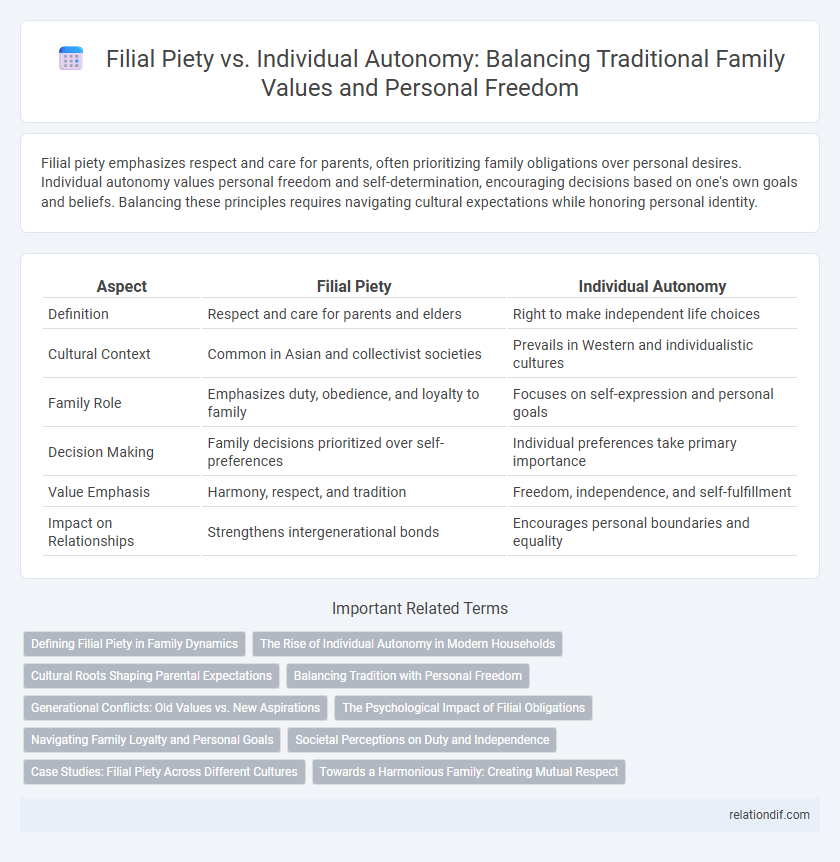Filial piety emphasizes respect and care for parents, often prioritizing family obligations over personal desires. Individual autonomy values personal freedom and self-determination, encouraging decisions based on one's own goals and beliefs. Balancing these principles requires navigating cultural expectations while honoring personal identity.
Table of Comparison
| Aspect | Filial Piety | Individual Autonomy |
|---|---|---|
| Definition | Respect and care for parents and elders | Right to make independent life choices |
| Cultural Context | Common in Asian and collectivist societies | Prevails in Western and individualistic cultures |
| Family Role | Emphasizes duty, obedience, and loyalty to family | Focuses on self-expression and personal goals |
| Decision Making | Family decisions prioritized over self-preferences | Individual preferences take primary importance |
| Value Emphasis | Harmony, respect, and tradition | Freedom, independence, and self-fulfillment |
| Impact on Relationships | Strengthens intergenerational bonds | Encourages personal boundaries and equality |
Defining Filial Piety in Family Dynamics
Filial piety in family dynamics emphasizes respect, obedience, and care for parents as a core value, deeply rooted in Confucian traditions. This concept often prioritizes family harmony and collective well-being over personal desires, influencing decisions in housing, career, and caregiving. Individual autonomy challenges this norm by advocating for personal freedom and self-expression, creating a balance that modern families navigate between cultural expectations and individual rights.
The Rise of Individual Autonomy in Modern Households
Modern households increasingly emphasize individual autonomy, reflecting a shift from traditional filial piety norms that prioritize family obligations over personal freedom. This rise in autonomy is driven by urbanization, higher education levels, and evolving cultural values that support self-expression and personal decision-making. Despite this trend, tensions often arise as younger generations balance respect for elders with their desire for independence.
Cultural Roots Shaping Parental Expectations
Filial piety, deeply rooted in Confucian values, emphasizes respect, obedience, and care for parents, shaping strict parental expectations in many Asian cultures. These cultural norms often prioritize family loyalty and collective harmony over individual autonomy, influencing decisions on education, career, and marriage. The tension between traditional filial obligations and modern desires for personal freedom reflects evolving dynamics in family relationships worldwide.
Balancing Tradition with Personal Freedom
Filial piety, deeply rooted in many cultures, emphasizes respect and care for one's parents, often shaping family dynamics and obligations. Individual autonomy advocates for personal freedom and self-expression, challenging traditional expectations within the family structure. Balancing these values requires open communication and mutual understanding to honor cultural heritage while embracing personal growth and independence.
Generational Conflicts: Old Values vs. New Aspirations
Filial piety, rooted in traditional family values, emphasizes respect and care for elders, often demanding obedience and sacrifice from younger generations. Emerging individual autonomy challenges these expectations, as younger family members pursue personal goals and self-expression, leading to tensions and misunderstandings. Generational conflicts arise when longstanding cultural norms clash with contemporary aspirations, requiring families to negotiate respect with independence.
The Psychological Impact of Filial Obligations
Filial obligations can significantly influence mental health by creating stress and anxiety stemming from the pressure to meet family expectations. Balancing respect for parental authority with the desire for individual autonomy often leads to internal conflicts and emotional strain. Understanding this dynamic is crucial for promoting psychological well-being in cultures that emphasize family duty.
Navigating Family Loyalty and Personal Goals
Balancing filial piety and individual autonomy involves respecting family expectations while pursuing personal aspirations, which nurtures both family loyalty and self-fulfillment. Prioritizing clear communication and setting healthy boundaries ensures that personal goals do not undermine familial responsibilities, promoting harmony within the household. Understanding cultural values and adapting them to modern contexts supports a dynamic equilibrium between honoring tradition and embracing independence.
Societal Perceptions on Duty and Independence
Societal perceptions of filial piety emphasize unwavering respect and care for parents as a fundamental duty, deeply rooted in cultural traditions and moral obligations. Individual autonomy challenges this norm by promoting personal freedom and self-determination, often creating tension between collective family expectations and individual rights. Balancing these opposing views requires navigating complex social dynamics where honoring parental authority and pursuing independent life choices coexist.
Case Studies: Filial Piety Across Different Cultures
Case studies reveal that filial piety expressions vary significantly across cultures, with East Asian societies emphasizing lifelong respect and care for parents as a moral duty, whereas Western cultures prioritize individual autonomy and negotiated care arrangements. In Confucian-influenced contexts, adult children often co-reside with or financially support aging parents, reflecting deep-rooted filial obligations. Contrastingly, in Western societies, elder care tends to be institutionalized or delegated, highlighting personal independence over traditional family hierarchy.
Towards a Harmonious Family: Creating Mutual Respect
Filial piety emphasizes respect and care for parents, forming the foundation of family harmony in many cultures. Individual autonomy allows family members to express personal identity and make independent choices, fostering self-growth. Balancing these values through open communication and mutual understanding creates a respectful environment where both tradition and personal freedom coexist.
filial piety vs individual autonomy Infographic

 relationdif.com
relationdif.com